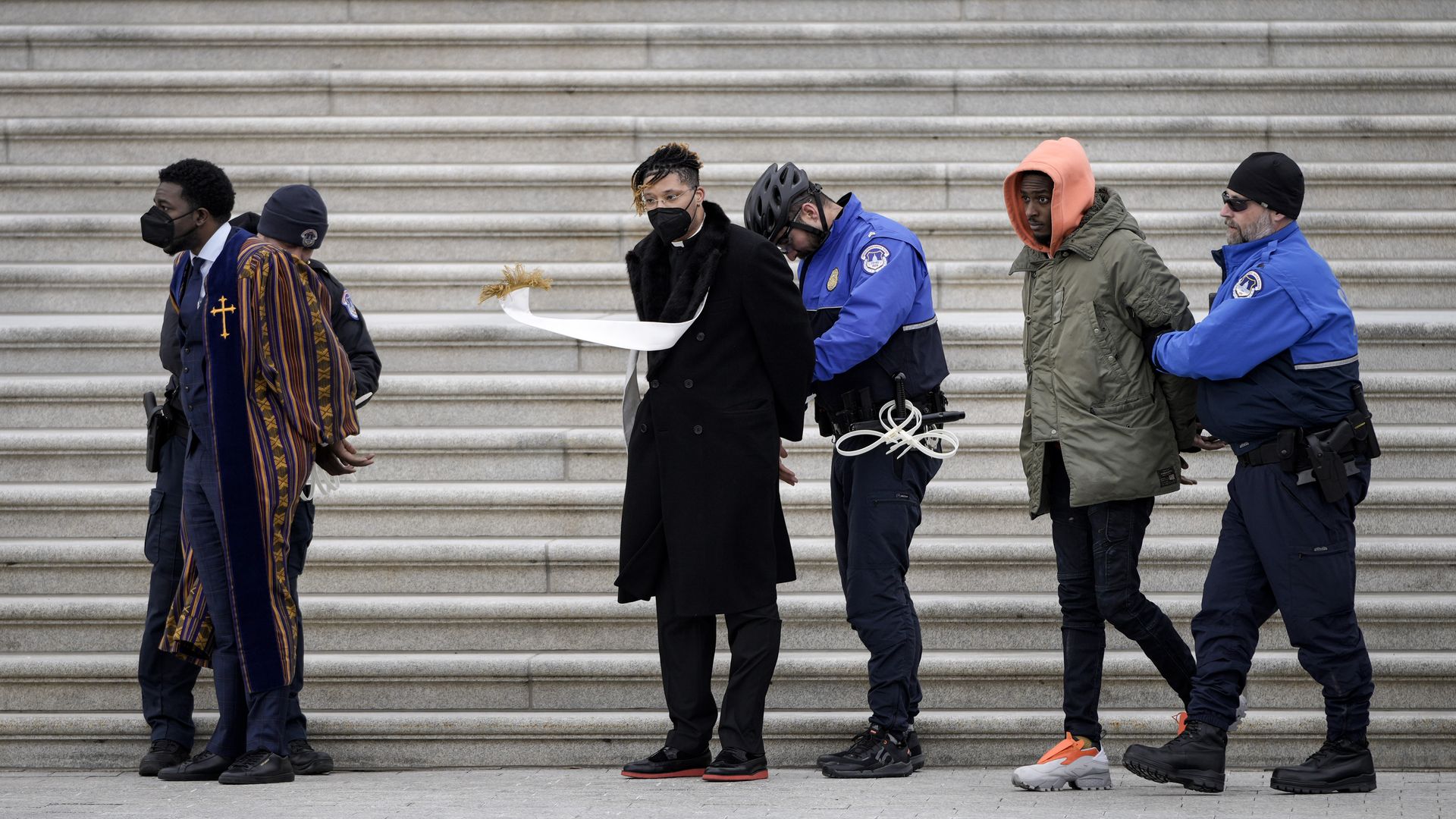Bipartisan group pushes reforms to protect election officials
Add Axios as your preferred source to
see more of our stories on Google.

Capitol Police detain protesters rallying for voting rights legislation Tuesday on the Senate steps. Photo: Drew Angerer/Getty Images
A bipartisan group seeking to update the Electoral Count Act of 1887 has other election reforms in mind, including creating federal penalties for harassing and intimidating state election officials — with improperly removing them among the punishable offenses, Axios has learned.
Why it matters: The 50-50 Senate is unlikely to pass broad-based bills like the Freedom to Vote Act or the John R. Lewis Voting Rights Advancement Act, so the ECA has emerged as a consensus target for more limited election changes.
- The group also has discussed providing states with more leeway to spend federal election grants.
- In addition, it's discussed reauthorizing legislation that created the Election Assistance Commission, a federal agency assisting states with election administration.
But, but, but: While there isn't much discordance about changes to the Electoral Count Act, issues like election worker protections are more contentious within the group.
- Some senators are wary of federal overreach, according to a source familiar with the group's discussions.
- Part of the opposition to the broader bills stems from their federal expansions of ballot access and campaign finance reforms.
- The more broadly supported changes discussed to the ECA include increasing the number of people who would need to object to a state's election results — from the current one senator and one representative — and clarifying that the role of the vice president in the process is merely ceremonial.
- President Trump tried to use the ECA to overturn the results of the 2020 election.
Between the lines: Some Democrats in the group, including Sen. Jeanne Shaheen (D-N.H.), are waiting until after votes on the broader bills and proposed filibuster changes before fully engaging, a Shaheen aide told Axios.
A vote on the Freedom to Vote Act could come as early as Wednesday.
- "Listening to additional ideas while also supporting — and cosponsoring voting rights legislation — are not mutually exclusive," Sarah Weinstein, a spokesperson for Shaheen, tweeted earlier this month.
- Justin Goodman, a spokesperson for Senate Majority Leader Chuck Schumer, stressed Democratic leaders haven't tried to stifle bipartisan work even as they forge ahead with votes on the broader legislation.
- “Democrats have been trying to negotiate with Republicans on election reforms for a year. Schumer publicly encouraged it when [Manchin] was trying,” Goodman told Axios.
The Democrats' reluctance to get ahead of their leadership on election reform is impacting more groups than just the bipartisan one.
- A group of Senate Democrats that includes Sen. Angus King (I-Maine), Sen. Dick Durbin (D-Ill.) and Sen. Amy Klobuchar (D-Minn.) has been working on Electoral Count Act reform since last March. It too is holding off discussion until after the Senate votes on voting rights.
- They've been clear that Electoral Count Act reform is independent of efforts to expand access to the ballot, and that one is not a substitute for the other.
- Senators also are approaching Sen. Susan Collins (R-Maine) on virtually a daily basis about joining the group, according to a source with knowledge of the membership. One of the new members is Sen. Lisa Murkowski (R-Alaska), no stranger to bipartisan election reform proposals.
What's next: The groups are both expected to reconvene shortly after the last votes on the comprehensive package and any rules changes this week.
- The bipartisan group will be focused on striking agreement on the easier issues and plotting a path forward, which may include eventually coming together with King's group, one source told Axios.

